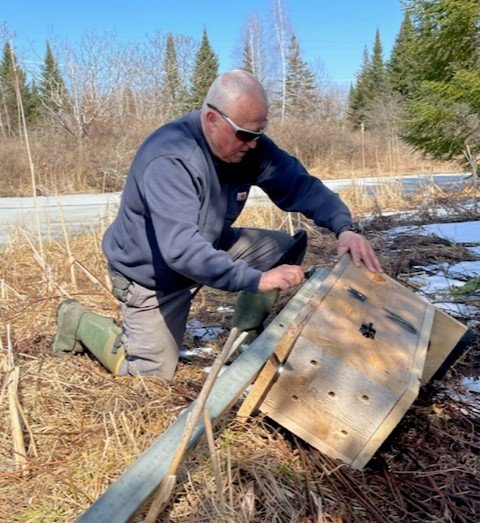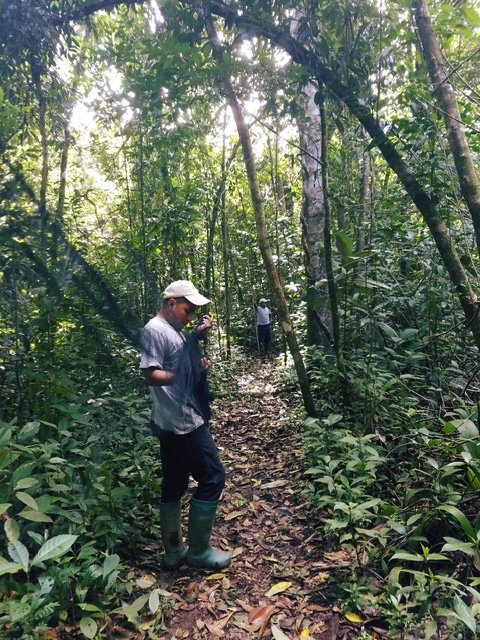Conservation of birds and bird habitat is at the heart of the GMAS’s mission, and recent projects that we supported through member contributions and program fees all advanced that work.
Bill Durbrow at work on a GMAS-funded Wood Duck box in the Catamount Community Forest
The first grant involved the construction of Wood Duck boxes in the new Catamount Community Forest in Williston, a designated Important Bird Area (IBA) that offers critical habitat for a variety of nesting birds, including Wood Ducks. The GMAS provided a $321 grant for materials for the boxes. According to Reed Parker of the Catamount Community Forest Committee, “Working with Bill Durbrow of Washington VT, who manages the Round Pond project, we assessed the ponds at Catamount, which range in size from one-half acre to two acres, and determined that they can support from one to two nesting boxes depending on the pond size. We installed one box at the largest pond in Fall of 2021 and the second on the smallest pond in Spring of 2022.” They plan to build an additional two boxes this summer, hoping to attract the attention of fall migrating ducks who may return next spring to nest. Additionally, the GMAS gave Catamount $200 for the prophylactic treatment of white ash trees against the Emerald Ash Borer.
Students from Saint Michael’s College plant native trees at the College’s natural area along the town line between Colchester and Essex, VT
The GMAS awarded a total of $4,000 to St. Michael’s College in two grants to support the removal of invasive species, the planting of native trees and bushes, and the restoration of native habitat in the St. Michael’s Natural Area in Colchester. St. Michael’s students carried out the work under faculty supervision from Professors Laura Stroup and Trevien Stanger, who expressed gratitude for “the opportunity to do something for water, birds, wildlife, and the climate.”
A variety of fruit trees planted at Camel’s Hump Middle School in Richmond, VT
A $200 grant went to Camel’s Hump Middle School to help transform a former vegetable garden into a new mini-orchard, with a total of six fruit trees, two each of peach, pear and cherry. According to Daniel Hamilton, one of the school’s teachers, the school has several outdoor learning spaces, and “students have created a pollinator garden, a native species garden, and this fruit garden, which replaces our old vegetable garden. Without financial support from the outside community, we wouldn't be able to offer these conservation and educational opportunities right on campus. This will be a place for ongoing learning about stewardship, the natural communities (including birds), pruning and maintenance, along with a grafting project in the future.”
A $200 grant also went to Hunt Middle School in Burlington to support aquatic studies and fish stocking. Mr. Pease and Ms. Picher’s 6th grade students raised and ultimately released trout into local streams. The students were videoed squealing with delight as they released the fish, examined salamanders and even kissed a trout that they had netted and then released back into the water. For many of the students, it was their first experience with hands on outdoor education, and several talked about how though it was initially scary, they really learned from and enjoyed the whole experience.
Mist nets purchased through a GMAS grant support bird conservation work in Belize
Finally, the GMAS grants also support important international bird conservation work, as evidenced by a $500 grant awarded to purchase mist nets for bird banding in Belize as part of MoSI, an international consortium of bird monitoring stations across Central and South America.
According to Mark LaBarr, Conservation Program Manager for Audubon Vermont, who managed the grant and went to Belize to help with the project, “Nets are already in action. Most if not all the folks that work [on the project] are from the local Mayan village. Thanks again to the GMAS for making this happen.”
~ Lucie Lehmann, GMAS Board




